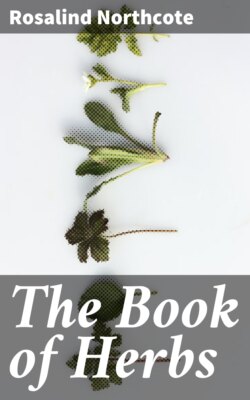Читать книгу The Book of Herbs - Rosalind Northcote - Страница 5
На сайте Литреса книга снята с продажи.
CHAPTER I
OF THE CHIEF HERBS USED IN THE PRESENT TIME
ОглавлениеTable of Contents
J’ai des bouquets pour tous les goûts;
Venez choisir dans ma corbeille:
De plusieurs les parfums sont doux,
De tous, la vertu sans pareille.
J’ai des soucis pour les galoux; La rose pour l’amant fidèle; De l’éllebore pour les tous Et pour l’amitié l’immortelle.
La petite Corbeille de fleurs.
Herbs, too, she knew, and well of each could speak
That in her garden sip’d the silv’ry dew;
Where no vain flow’r disclos’d a gaudy streak;
But herbs for use, and physic, not a few,
Of grey renown within those borders grew;
The tufted basil, pun-provoking thyme,
Fresh baum, and mary-gold of cheerful hue;
The lowly gill,[3] that never dares to climb; And more I fain would sing, disdaining here to rhyme.
Yet euphrasy[4] may not be left unsung, That gives dim eyes to wander leagues around; And pungent radish, biting infant’s tongue; And plantain ribb’d, that heals the reaper’s wound; And marj’ram sweet, in shepherd’s posie found; And lavender, whose spikes of azure bloom Shall be, ere-while, in arid bundles bound To lurk amidst the labours of her loom, And crown her kerchiefs clean with mickle rare perfume.
The Schoolmistress.—Shenstone.
John Evelyn once wrote an essay called “Acetaria: a Discourse of Sallets,” and dedicated it to Lord Somers, the President of the Royal Society. The Dedication is highly laudatory and somewhat grandiloquent, comparing the Royal Society to King Solomon’s Temple, and declaring it established for the acquirement of “solid and useful knowledge by the Investigation of Causes, Principles, Energies, Powers and Effects of Bodies and Things visible; and to improve them for the Good and Benefit of Mankind. … And now, My Lord, I expect some will wonder what my Meaning is, to usher in a Trifle with so much magnificence, and end at last in a fine Receipt for the dressing of a Sallet with an handful of Pot-herbs! But yet, my Lord, this Subject as low and despicable as it appears challenges a Part of Natural History; and the Greatest Princes have thought it no disgrace, not only to make it their Diversion, but their Care, and to promote and encourage it in the midst of their weightiest Affairs.” This disquisition casts an unlooked-for air of dignity over the Salad-bowl! The discourse itself is very practical, and begins with the Furniture and Materials of which a Salad may be composed. Eighty-two items are mentioned, but all cannot be called strictly in order, as Oranges, Turnips, Rosemary, and Judas Tree flowers, and Mushrooms are amongst them!
In the table at the end of this list Evelyn, “by the assistance of Mr. London, His Majesty’s Principal Gardener, reduced them to a competent number, not exceeding thirty-five,” though he suggests that this may be “vary’d and enlarg’d by selections from the foregoing list.”
The essay finishes with philosophical reasoning on the subject of vegetarianism. History is called upon to furnish examples of sages, of all times, favourably inclined to it, but Noah is allowed to differ on account of the “humidity of the atmosphere” after the Deluge, which must have necessitated a generous diet. Most people would think thirty-five different kinds a liberal allowance for salad herbs alone, but Abercrombie, writing in 1822, gives forty-four, and it is worthy of notice, that within the last eighty years, ox-eye daisy, yarrow, lady’s-smock, primrose and plantain were counted among them.
In this chapter, the herbs mentioned are those chiefly used nowadays; in the next chapter, these that were favourites au temps jadis. It is a difficult line to draw, for the popularity of many of them is, like themselves, evergreen, but I have tried to put in the second chapter those that have passed the zenith of their fame, though they may still ride high in public estimation.
[3] Ground-ivy.
[4] Eye-bright.
